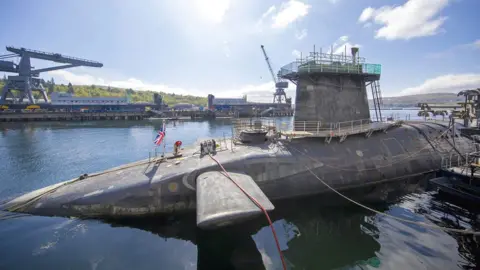Defence giant Babcock International to cut 1,000 jobs
 Getty Images
Getty ImagesBabcock International, the UK's second largest government defence contractor, is cutting 1,000 jobs and has announced "significant" write-offs that will affect profits.
The majority of the jobs will be lost in the UK following a strategic review of the company.
Babcock said it had reviewed a number of its contracts and expects write-down and impairment charges to reach £1.7bn.
As a result, underlying profit will be £30m lower a year "for future periods".
Babcock, which provides maintenance and support for the UK's nuclear submarines at Faslane in Scotland, employs about 27,000 people in the UK out of 30,000 worldwide.
Around 850 jobs in the UK will be lost as part of the company's plan to simplify the business and reduce layers of management.
As part of the wider review, Babcock said several business lines were likely to be sold off, raising "at least" £400m, and the group will be restructured.
Investors welcomed the proposals, sending Babcock's share price soaring by 28.5% to 311p each.
 Babcock
BabcockThere had been concerns that Babcock would have to tap shareholders for funds through a rights issue.
However, Babcock chief executive David Lockwood said: "Through self-help actions, we aim to return Babcock to strength without the need for an equity issue.
"We are creating a more effective and efficient company through our new operating model and, in line with our new strategic direction, will rationalise the group's portfolio to help strengthen our balance sheet."
Mr Lockwood, who was previously chief executive of aerospace manufacturer Cobham, joined Babcock in September last year and launched a strategic review of the business.

Analysis
Rob Young, BBC business presenter
It may seem strange that a company admits it has to write-off £1.7bn and the shares rocket. Investors feared things were so bad at Babcock International that the company would ask them to stump up more money.
That hasn't happened.
But the metaphorical new broom at Babcock seems to have had a go at sweeping in every nook and cranny of the sprawling, complex company.
What the new-ish chief executive, David Lockwood, has found may not be pretty in financial terms, but this corporate kitchen-sinking - getting all the bad news out there in one go - allows the company to say it has plans to start afresh.
Owners of companies like to know exactly what's going on; markets hate not knowing how bad things are.
Babcock, which operates support services, is worth less than a third of its value five years ago. Other outsourcing firms, such as Serco, Capita and Carillion, have had a torrid time. However, markets seem to think that Babcock, a company that's involved in the defence of the realm, has a fighting chance of turning itself around.

Part of the company's plans include selling off its helicopter transport business, Avincis, which Babcock acquired in a deal valued at £1.6bn from private equity giant KKR in 2014.
At the time, Babcock launched a rights issue to raise £1.1bn to help fund the takeover.
In Tuesday's update, Babcock said the acquisition "has not delivered shareholder value with low returns on high amounts of invested capital".
It is selling the oil and gas aviation part of the business - which transports workers to offshore platforms - to helicopter operator CHC Group and is reviewing its options for the rest of the division.
Babcock said it would focus on the international aerospace, defence and security sectors across the UK, France, Canada, Australia and South Africa.
